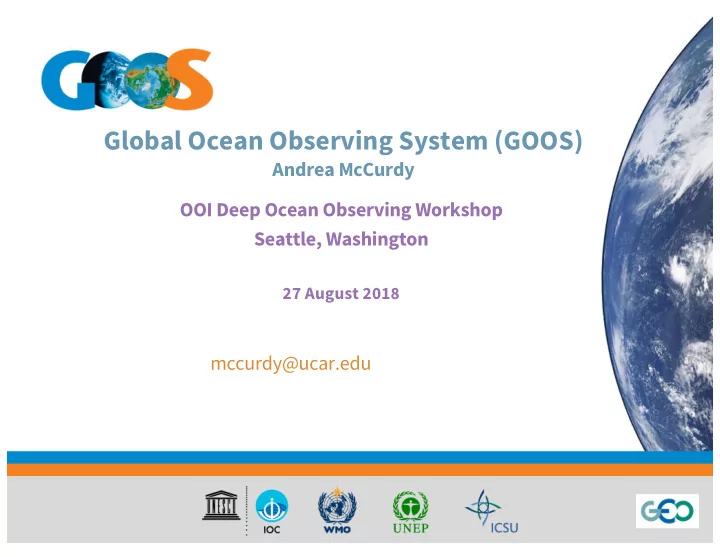

Global Ocean Observing System (GOOS) Andrea McCurdy OOI Deep Ocean Observing Workshop Seattle, Washington 27 August 2018 mccurdy@ucar.edu
GOOS essential observations for societal benefit Climate, operational services, ocean health
www.goosocean.org Info on Panels and EOVs DOOS Webinars Search: GOOS Webinars
Framework for Ocean Observing • FOO Origin • Ocean Obs ‘09 Task Team: Integrated Framework for Sustained Ocean Observing • Report Released in 2012 • GOOS Adoption and Alignment with Governance Model Recommendation
Framework for Ocean Observing Framework for Ocean Observing High level objectives • Take lessons learned from successes of existing observing efforts – best practices • Guide observing community as a whole to sustain and expand the capabilities of the ocean observing system • Deliver and observing system that is fit-for-purpose • Promoting collaborative alignment of independent groups, communities and networks, building on existing structures as much as possible
Framework for Ocean Observing A simple system Input (Requirements) Output Process (Data & (Observations) Products)
Framework for Ocean Observing A systems approach
Framework for Ocean Observing Opening up to new societal drivers Climate and Blue Economy Assessments and Weather management of Regional ecosystem services Hazard priorities services Requirements Data Products & Expanded EOVs Services Expanded observing systems and networks
Essential Ocean Variables: all GOOS panels
Driven by requirements, negotiated with feasibility Essential Ocean Variables • We cannot measure everything, nor do we need to • basis for including new elements of the system, for expressing requirements at a high level • Driven by requirements, negotiated with feasibility • Allows for innovation in the observing system over time • Global and ubiqutous impact
Towards sustained system: requirements, observations, data management Readiness
FOO System Elements and Readiness Levels Thank you
Thank you
Recommend
More recommend